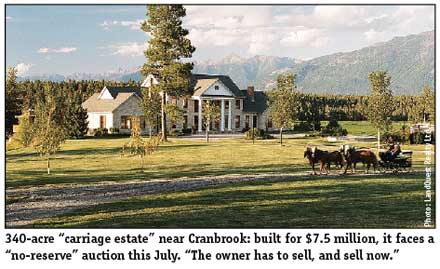Other

NEW YORK, NY – NOVEMBER 09: TV personality Stephen Colbert (L) and Craigslist CEO Craig Newmark attend IAVA’s Fifth Annual Heroes Gala at Cipriani 42nd Street on November 9, 2011 in New York City. (Image credit: via @daylife)
Craiglist has long been criticized for a failure to innovate (it has also been criticized for having among the “most draconian” terms of services of any major website on the internet). And instead of innovating, it has chosen to go after new market participants that have wanted to use Craigslist’s data on classified postings.
One of these websites is www.padmapper.com, which was sued for obtaining Craigslist’s data and placing it on a map. This allows for users to more easily aggregate, browse and search all available apartments across various services
Padmapper took a series of data points: cost of apartment, location, size and 1BR-4BR type of information, and allowed for customers to search on that basis. And when customers found what they wanted, they would click and be directed back to Craigslist to read the full posting and complete the transaction – thus potentially generating Craigslist new customers and more satisfied sellers. Seems like a win-win.
In addition to the copyright charge, Craigslist has gone after Padmapper and other websites for violating their terms of service (ToS) and the Computer Fraud & Abuse Act (CFAA). In Craigslist’s ToS they allow for websites like Google and Bing to “scrape” and index their website, but do not allow for other non general indexing websites to do so.
Craigslist has used the threat of copyright infringement as a sledgehammer to scare innovators from competing with Craigslist by using its data. Copyright infringement penalties are stark, so being found liable here would potentially lead to trillions of dollars in damage – yes trillions. The problem is, despite Craigslist using the threat of copyright violation to go after these new companies – Craigslist never retained copyright to begin with. And today a federal court made that clear. In Los Angeles a California federal judge dismissed the copyright claims against Padmapper and other companies on the basis of them not even having copyright to begin with.
Craigslist was claiming:
- That it retained copyright to postings made by its customers; and
- That taking these data points of cost and location constituted infringement.
By a consensus of legal experts (see EFF, PK, and Techdirt’s commentary), these claims were vacuous, but they have been successfully used to scare would be competitors. But perhaps Craigslist’s days of using false threats to scare new start-ups is over.
Its claim that it has a copyright to its customers’ postings is new information to its customers. How would you feel knowing that if you posted your resume on Craigslist that Craigslist now has copyright to your resume?
While customers granted Craigslist a license, they never granted Craigslist their copyright. The license was not an “exclusive license” (other than a small window that isn’t the basis of ongoing litigation). Further, Padmapper and other websites taking these data points is clearly within the limits of Feist and other Supreme Court cases establishing that data points are not copyright-able (Feist is one seminal case but other cases may be more up-to-date with current jurisprudence).
In laymen’s terms, Craigslist never had the copyright and taking the data points isn’t infringement.
It’s very good news that these charges were dismissed, hopefully this will discourage Craigslist from going after the next competitor with baseless charges.
But this isn’t the end of the legal issues. Craigslist is still forcefully pursuing on ToS and CFAA (some of the CFAA allegations were thrown out, but not all of them). It’s curious that a company that prominently displays opposition to the CFAA and encourages customers to get involved to fix the CFAA, is at the same time suing start-ups for violating the CFAA for precisely the problems for which tech activists have ridiculed the CFAA, and, in particular, its application against Aaron Swartz. That problem being, according to tech activists, the CFAA should not be implicated merely for violating the terms of service of a website – terms that until recently prohibited all minors from accessing Google, that still require you to fill your Facebook with accurate data, or that require your profile on dating websites to be completely accurate. If companies like Craigslist want to be on the right side of fixing this law, then they should practice what they preach.
Furthermore, Craigslist’s ToS include liquidated damages for “scraping” their website at $25,000 per incident – an incredible sum given that liquidated damages are supposed to represent an estimate of actual damage incurred, rather than serve as a penalty. According to Craigslist, over 100 million classified ads run on its site each month. Over the course of a year, this equates to approximately one billion ads online (assuming some repeats). According to this figure, if Craigslist were scraped at least once a day, the potential liability for one scraper under this provision could be as high as $9125 Trillion (365 billion “scrapes” at $25,000 per incident).
Obscenely high damages are not unusual for copyright infringement but for contract law this is insane. Again, liquidated damages are supposed to be an estimate of actual damages – not a penalty. Their contract represents a good faith belief by Craigslist that scraping their website once a day costs them $9125 trillion – this is beyond belief. Oppressive terms like these in their ToS should not be tolerated by competitors or consumers – and the internet eco-system should hold market participants accountable for this type of legal scare tactic to stifle innovation.
Going forward, innovators will likely find ways to aggregate and utilize the data without violating the terms of service. The ruling today may have cleared the way for innovators going forward, and hopefully put an end to bad faith and baseless legal threats by Craigslist against competitors. (To be clear, I am not taking a stance on the legality or ethics of scraping from Craigslist, merely observing on the use of a false copyright claim).
Let this be a lesson to tech companies: if you want to copyright user data, you must make it explicit that you are taking users’ data and claiming exclusive ownership of that data. And consumers can decide if they want to stay with you, or go to a competitor who will not claim their resume as intellectual property retained by the website.
As the House Judiciary Committee will hold hearings and considering wholesale revisions to copyright law, it should consider stronger provisions for misusing copyright law for other purposes as displayed here. Using false claims of copyright, for something that a company doesn’t even have copyright ownership of, for the purposes of going after start-ups and competitors should be punishable and discouraged. Copyright law is a giant sledgehammer creating trillions of dollars in liability, if companies are misusing it to shut down competitors, that is something that we can fix and address. So called, “copyright misuse” or “copyfraud” to scare new market participants should be penalized for what it is – a tax on innovation. And Republicans who have spent decades complaining about outrageous tort claims and calling for wholesale tort reform should want a copyright system that strongly protects legitimate copyright holders but ensures that false copyright claims aren’t abused.


